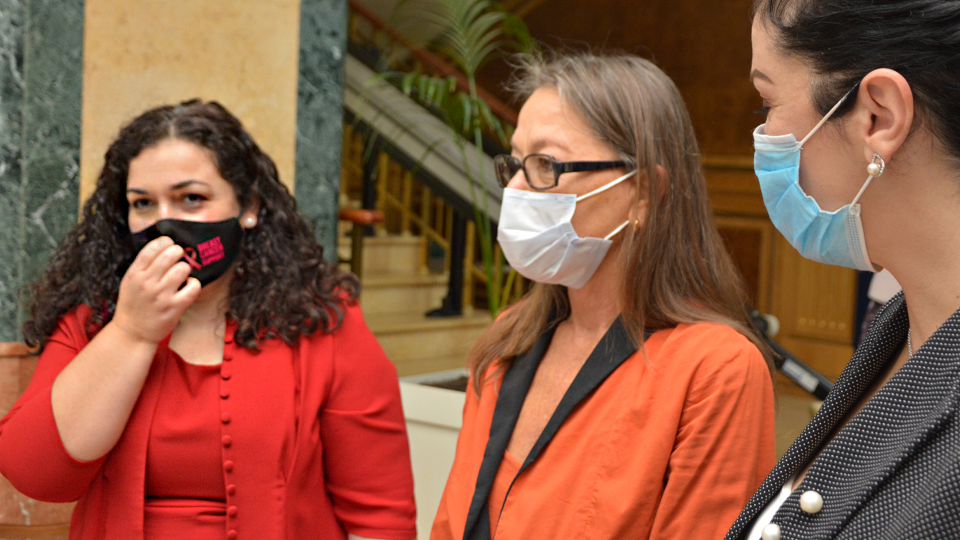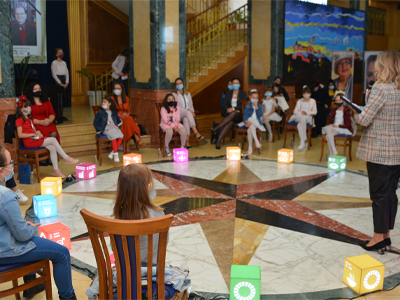Kosovo celebrates the successes and dreams of young women and girls
In line with the theme of this year’s International Day of the Girl Child, ‘My Voice, Our Equal Future’, the event organized in the Kosovo Assembly served as an occasion to share stories of inspiring girls and girl-led initiatives to amplify their leadership, actions and impact.Date:

On October 11, around 50 young women and girls gathered in the Kosovo[1] Assembly building to listen to inspiring stories of young role-models and celebrate the International Day of the Girl Child. Under the global theme “My voice, Our Equal Future”, UN Women supported this unique celebration, placing a spotlight on the recognition of girls’ rights, as well as, encouraging them to become a generation of activists that advocate for social change.
Girls from around Kosovo came together with their teachers, Assembly President, Deputy President, UN Women, and UN Development Coordinator to celebrate the power and potential of all girls. “Girls need support. The future is better, when every girl has the space and opportunities to live their dreams and let this be the legacy we will leave to future generations,” stated H.E Vjosa Osmani, the first woman Assembly Speaker in Kosovo in her welcoming remarks.
Ulrika Richardson, UN Development Coordinator in Kosovo, thanked the Kosovo Assembly and UN Women for organizing the event and said: “This is a powerful moment in the Assembly, because all of you girls are future leaders of Kosovo. We are here today to change the world and as a girl you can do anything you want!”

The event provided an opportunity to showcase how girls should support each other and a space to share their dreams for the future. On this occasion, UN Women Head of Office Vlora Tuzi-Nushi stated: “On the International Day of The Girl, we are reminded that it is our responsibility to give girls the space and inspiration so that they can achieve their goals. We need to work towards removing barriers which hinder the full empowerment of girls.”
The event started with a special encouraging video message from famous singer Rita Ora, addressing the young women and girls, emphasizing that nothing is impossible if they believe in themselves: “Whether you choose to be a doctor, ballerina, athlete, painter, actor, scientist, you can choose your own path. This can help women in the world to really believe in themselves and realize that they have the capacity, knowledge, and the power to make the choices for their own future. Go and rock your own world and remember you have the power!”
Event participants included young women role models who had climbed the highest peaks, took part in the most difficult races, and had the courage to express themselves in male-dominated fields. Among them are Olympics participant Rita Zeqiri, young mountaineer Mrika Nikqi, ballerina Rreze Qerreti, pediatrician Valbona Dërmaku, astronomer Qendresa Mehmeti, pianist Riola Susuri, IT Programmer Arta Shehu Zaimi, military cadet Alisa Ramadani and painter Engji Jaha. They all shared their inspiring stories, with a clear message that no girl should ever give up despite the challenges they may face, and that there are no limits to what a girl can achieve in her life.
This activity was supported by UN Women, through the joint UN Kosovo Team “Youth for Kosovo” project funded by the UN Peacebuilding Fund. All necessary COVID-19 and public health precautions were fully followed; ensuring that the physical distance between the participants is in line with the requirements of the Institute of Public Health.
[1] All references to Kosovo on this website should be understood to be in the context of the UN Security Council Resolution 1244 (1999).